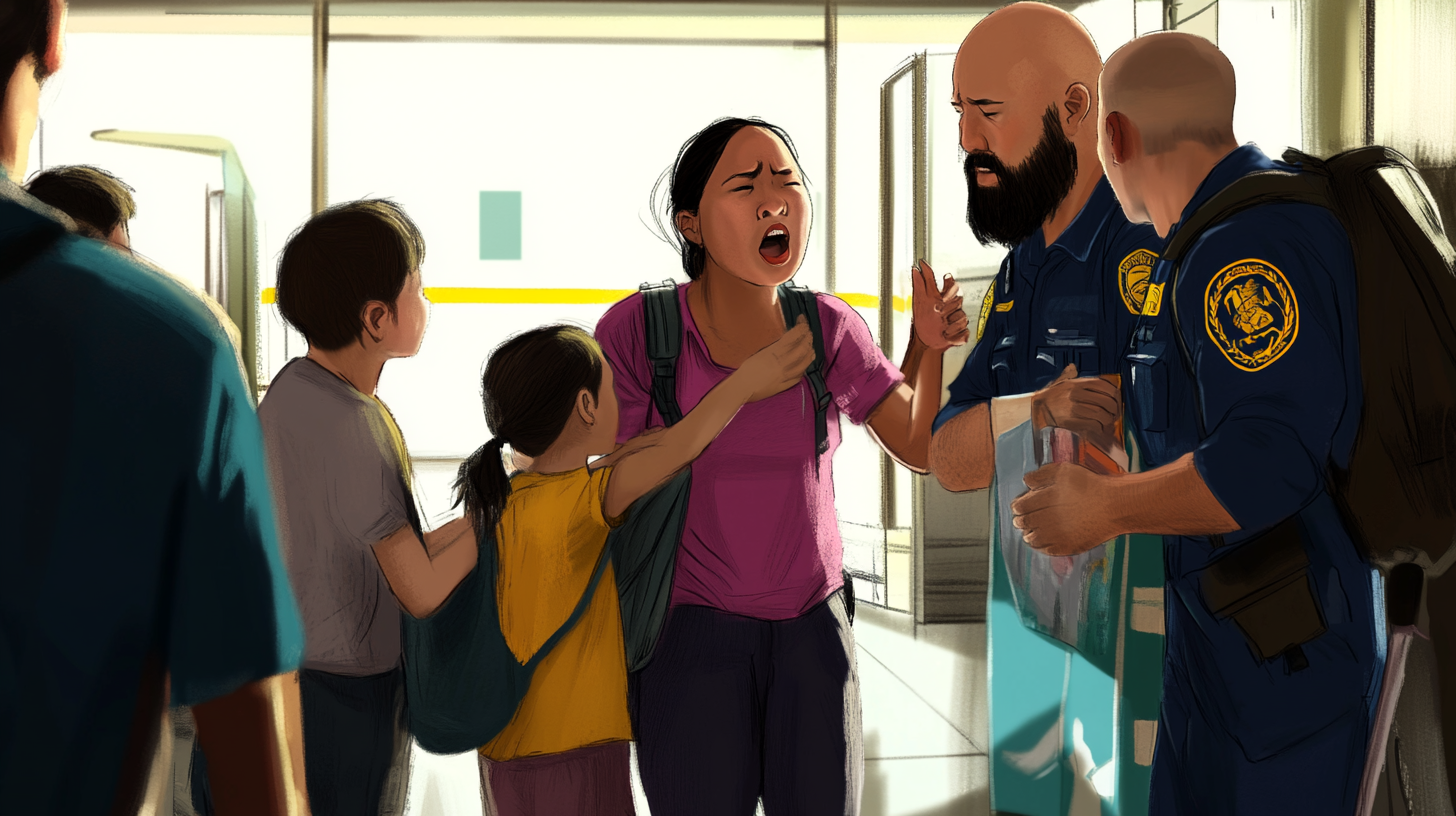A Plane Ticket, a Panic Attack, and the Cold Math of U.S. Border Fear
But the cursor hovers over “Purchase.” I picture a different scene: fluorescent hallways, back‑to‑back benches, an officer in Kevlar repeating “Secondary — this way, ma’am.”

Why one mixed‑passport family is still debating whether to fly, and how airport detentions are ripping holes in America’s welcome mat
I click “Hold Fare.” The airline locks in a July price: Manila / LAX / Tucson.
My Dad’s voice is in my head: “Son, it’s time the grandkids saw Arizona.”
But the cursor hovers over “Purchase.” I picture a different scene: fluorescent hallways, back‑to‑back benches, an officer in Kevlar repeating “Secondary — this way, ma’am.”
My wife is Filipino. My daughter is thirteen. My son is six, autistic, and panics in echoey rooms. Both are American citizens.
In that picture, I can’t reach my wife once the frost‑glass door swings shut.
That picture isn’t paranoia. It’s stitched from real headlines.
- May 2025, Honolulu: Nicolle Saroukos, an Aussie military spouse, refused entry because CBP said she packed “too many clothes.” Fingerprints. DNA swab. Overnight lock‑up. Deported next morning.
- June 2025, Newark: An Indian student handcuffed, health‑checked, and told he’d be sent back once “medically fit.”
- April 2025, Las Vegas: TikTok megastar Khaby Lame briefly detained over a visa‑date glitch. If a man with 162 million followers isn’t immune, what chance do we have?
Every story ends the same: “We acted within authority.”
“Relax, It’s Rare.” Is It?
Friends reassure me: “Detention is a one‑in‑a‑million thing.” The numbers tell a messier story.
The U.S. Travel Association says that in March 2025, international visits from Western Europe were 17% lower than the same month in 2019, Asia remained 25% down, and South America slid 10% year‑over‑year. Overall arrivals are forecast to hit 77.1 million in 2025, a 6.5 % bump from 2024, but the recovery is uneven.
Agents whisper that “soft” travelers — families, first‑timers — are the ones hesitating. Corporate flyers and emergency visits fill the gap.
The optional traveler? Paused.
Why the Fear Hits Harder in 2025
Policy: The pandemic bans travelers, lifts, and then new bans on 12 countries as of June 2025. Rules mutate faster than airlines update FAQs.
Social: One TikTok video of someone sobbing in a CBP interview room racks up 4 million plays. Fear scales better than reassurance.
Algorithms: CBP’s risk‑scoring software flags travelers for reasons nobody explains. Randomness breeds folklore.
The Suitcase Math That Can Get You in Trouble
Saroukos’s “too many clothes” fiasco sounds absurd until you read CBP’s handbook: officers can infer immigrant intent from “excess personal effects.” One officer’s “excess” is another’s tidy over‑packer.
You could wind up lounging on Waikiki’s beaches, or just as easily sitting in a detention jumpsuit on an overnight flight back home.
My wife packs like a quartermaster: extra pajamas, pasalubong gifts, a rice cooker if baggage allows. How many hoodies equal “too permanent”?
Nobody knows.
Our Family Equation
Variables: Me, an aging Gen Xer, one Filipino spouse nursing PTSD, panic attacks, and a boatload of anxiety. One autistic son who melts down when strangers touch his bag, one shy daughter scared of travel, one headline per week about detention “inconsistencies.”
When the numbers stop making sense, our feelings take the wheel.
What We’re Doing Instead of Booking the Flight
As of our latest conversation, our USA trip is permanently shelved. I will be going to the USA by myself. This will crush my parents who, at 83, just want to see their daughter-in-law and grandkids.
Maybe one day when U.S. policy changes, we can go. I just hope my parents are around by then.
America’s Loss — More Than Tourism Dollars
The National Travel & Tourism Office says each overseas visitor drops about $4,600 into the U.S. economy. That cash pays taxi drivers, Airbnb hosts, hotel cleaners, park rangers, and food‑truck owners.
Because Europe, Asia, and South America are still below their 2019 visitor levels, the U.S. is missing roughly six million travelers. Multiply that by $4,600 and you get almost $28 billion that never makes it into American pockets. That’s enough to cover the yearly paychecks of about 200,000 service workers.
Money isn’t the only thing walking away. Every tourist is a free ambassador.
When fewer families stand under the Grand Canyon’s rim or stroll Bourbon Street, fewer photos hit social media saying, “America is friendly, come see it.”
Ipsos, a research firm that ranks country reputations, says the U.S. slipped from #5 to #7 in 2024. In 2025, that reputation has only gone down more.
One big reason: travelers feel the border has grown unwelcoming. That ding shows up later when students choose Canada over California or when big conferences move to Lisbon instead of Las Vegas.
Short version: Block a passport today and you lose two things — cash right now and goodwill down the road.
“I Just Want to Hug Grandma”
My daughter keeps asking when she can plant a kiss on my moms cheek. My son, who adores planes and big cars, just wants to ride the plane and travel the USA in a car. They shouldn’t have to learn words like “secondary inspection” or worry about cold concrete floors.
They should be able to see their grandparents, and my three grown boys, who are brothers they have never met.
I should be able to show them the country I grew up in and that I USED to be proud of.
How It Ends — for Now
Our fare hold expires tonight. I’ll probably won’t hit “extend” again. Dad pleads for us to come home on Zoom. Mom tears up when my son waves at her through the webcam.
No matter how many videos and news reports I send, my parents can’t believe it’s really that bad.
I’m not after sympathy, just clear rules. Tell me what papers to bring, how much to pack, and what questions to answer. Do that, and we’ll fly tomorrow.
Until then, love keeps wrestling with risk, and risk keeps winning.
What Could Fix This
- Post the real detention numbers every month. Sunshine kills rumors.
- Set up a 24‑hour hotline that can step in before someone is put on a plane home.
- Freeze major policy changes for at least a year so travelers can plan.
- Make secondary areas less harsh — quiet rooms, sensory kits for kids, clear updates every hour.
Safe and welcoming do not have to fight each other.
A Note to the Officer Who Might Read This
Officer, if we ever do decide to go to America, the moment you meet us you’ll have two ways this story can go.
Option 1 — quick stamp. You check our papers, see the return tickets, and clear us in under two minutes. We walk out smiling, buy airport lattes, book hotel rooms, tip every server who keeps the kids’ fries coming, and spend five solid weeks dropping money in diners, outlet malls, state‑park gift shops, and (yes) the toy aisle at Target. That cash stays local and the selfies we post say, “America is friendly, come visit.”
Option 2 — long hold. You send my wife to secondary, my daughter starts to cry, my autistic son goes into sensory overload, and the clock drags on. When the door finally opens — whether it’s two hours or twenty — we’ll take the next flight back to Iloilo City, cancel every U.S. plan, and tell everyone we know to think twice before booking their own trip.
One decision decides where our money goes and what story travels with us. We’re not asking for special treatment, just a fair shake and a clear path.
Please help us show our kids that the country on their passport can still feel like home.
Plain‑Talk Takeaway
Here’s the simple truth.
- Detentions happen. They may be rare on paper, but each one echoes across WhatsApp groups and travel forums. Fear spreads faster than facts.
- Families pay attention. Parents won’t risk a nightmare layover just to snap Statue‑of‑Liberty selfies. If the border feels like a lottery, we stay home.
- The numbers agree. Those six million missing travelers and $28 billion in lost spending aren’t flukes: they’re the bill for mixed signals at the airport door.
America can fix this. Publish real data, offer real help lines, and train officers for compassion as well as security. Do that and the hugs, and the dollars, will come back.
Until then, my boarding pass sits in email limbo, same as thousands of others. Love is packed and ready, but risk still calls the shots.
